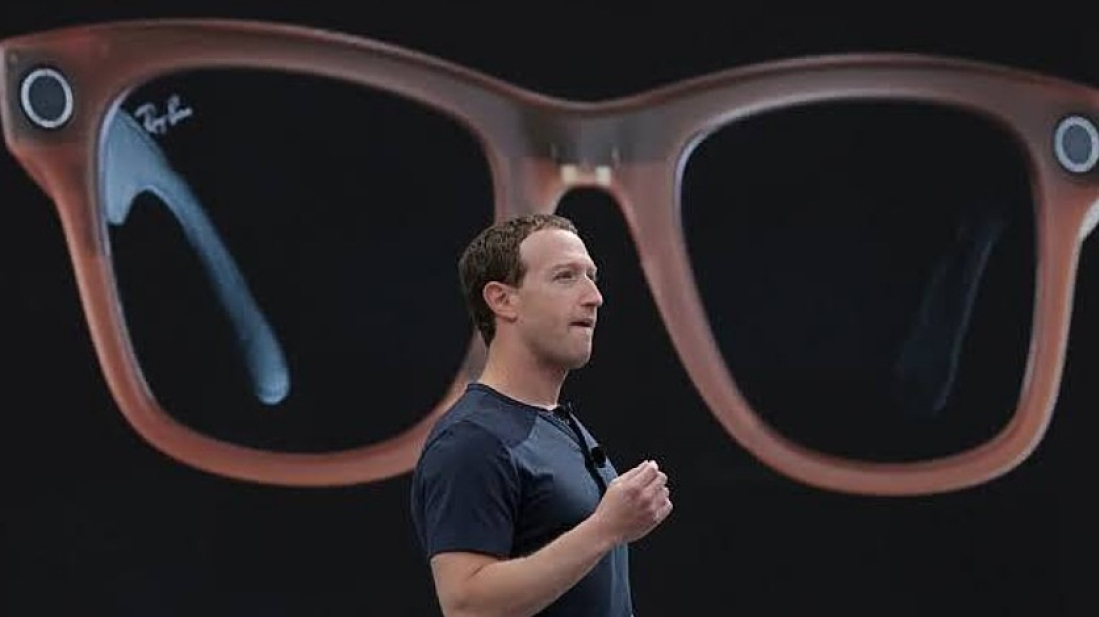Hegseth: U.S. making gains in Iran conflict as key target eliminated
U.S. Defense Secretary Pete Hegseth says the United States is making gains in its conflict with Iran after a key I...

Mark Zuckerberg envisions a future where Artificial Intelligence (AI) powered glasses aren’t just cool, they’re essential. During Meta’s Q2 earnings call, he predicted that those without AI eyewear may soon face a serious "cognitive disadvantage."
Echoing ideas from his blog post on 'superintelligence,' Meta CEO Mark Zuckerberg emphasized during the company’s Q2 earnings call, that smart glasses will be the primary way humans interact with AI.
“I think in the future, if you don’t have glasses that have AI, or some way to interact with AI — you’re probably going to be at a pretty significant cognitive disadvantage,” he told investors.
Zuckerberg believes glasses are ideal for AI interaction since they can 'see what you see, hear what you hear, and talk to you,' making them a natural fit for digital assistants.
He pointed to Meta’s investment in devices such as the Ray-Ban Meta and Oakley Meta glasses, which already support features like music, photos, and voice AI. Sales of these devices have reportedly tripled year-over-year.
Still, he stressed the importance of incorporating displays into these glasses, referencing upcoming Augmented Reality (AR) products such as Meta’s Orion headset.
Reality Labs, Meta’s division focused on AR and VR, continues to operate at a loss—$4.53 billion in Q2 alone, but Zuckerberg frames it as a long-term bet on the future of computing.
While other tech players like OpenAI, Humane, and Limitless experiment with AI pins and pendants, Zuckerberg maintains that glasses will lead the way.
U.S. President Donald Trump said the U.S. military has enough stockpiled weapons to fight wars "forever"; in a social media post late on Monday. The remarks came hours before conflict in Iran and the Middle East entered its fourth day.
U.S. first lady, Melania Trump chaired a UN Security Council meeting on children and education in conflict on Monday (2 March), a move criticised by Iran as hypocritical following U.S. and Israeli strikes that triggered a UN warning about risks to children.
A torpedo from a U.S. submarine has sunk an Iranian warship off the coast of Sri Lanka, U.S. Secretary of Defense, Pete Hegseth told reporters. The Sri Lankan navy carried out a rescue operation for dozens of sailors in the wake of the strike.
The U.S. embassy in Riyadh was hit by two drones resulting in a limited fire and some material damage, the kingdom's defence ministry said in a post on X on Tuesday, citing an initial assessment.
The U.S.-Iran crisis has entered its third day, with further strikes reported across the Middle East and the death toll rising. Oil prices have surged to levels last seen during the Covid-19 pandemic, raising fears of economic disruption and higher prices worldwide.
South Korea will soon cease to be one of the few countries where Google Maps does not function fully, after its security-conscious government reversed a two-decade-old policy and approved the export of high-precision map data to overseas servers.
New research suggests 40,000-year-old carved objects from south-western Germany bear repeated marks arranged in organised sign sequences similar to early proto-cuneiform, although they are not regarded as a form of writing.
The chief executive of Google DeepMind, Demis Hassabis, has called for more urgent research into the risks posed by artificial intelligence, warning that stronger safeguards are needed as systems become more advanced.
NASA successfully completed a critical fueling rehearsal on Thursday (19 February) for its giant moon rocket, Artemis II, after earlier hydrogen leaks disrupted preparations for the next crewed lunar mission. The launch is scheduled for 6 March, according to the latest information from NASA.
ByteDance will take steps to prevent the unauthorised use of intellectual property on its artificial intelligence (AI) video generator Seedance 2.0, the Chinese technology firm said on Monday.
You can download the AnewZ application from Play Store and the App Store.

What is your opinion on this topic?
Leave the first comment